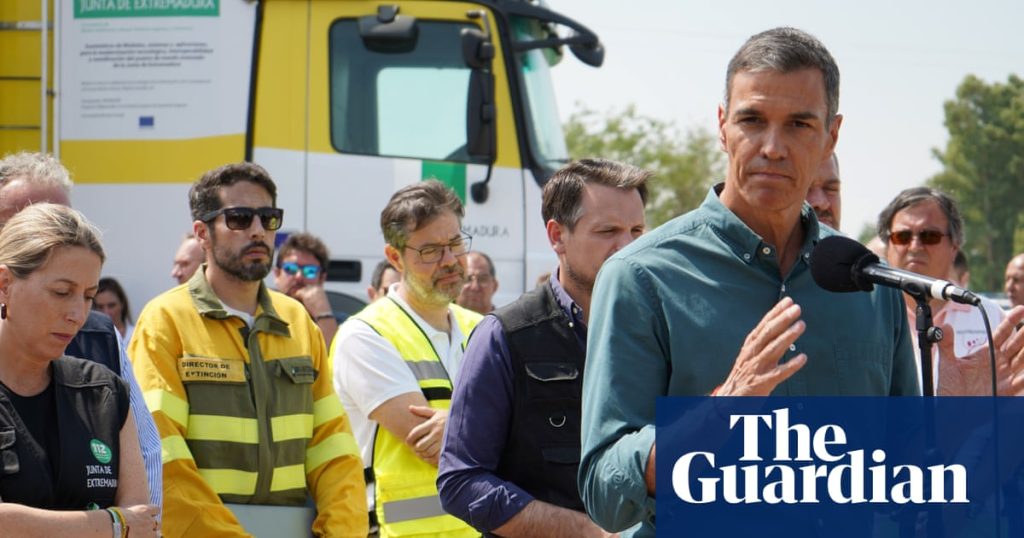The wildfires that have devoured 382,000 hectares of land in Spain and killed four people underscore the need to “readjust and recalibrate” the country’s preparation and response capacities as part of a non-partisan effort to tackle the impacts of the climate emergency, the prime minister has warned.
Speaking during a visit to the south-western region of Extremadura on Tuesday, Pedro Sánchez said that while the record-breaking 16-day heatwave that had fanned the flames was over, “difficult hours” lay ahead as firefighters continued to battle huge blazes across parts of the country.
The prime minister said the wildfires – and last year’s disastrous floods in the eastern region of Valencia – were clear proof that the climate emergency was hitting Spain harder and harder each year.
According to Spain’s Carlos III public health institute, 1,149 excess deaths across the country between 3 August and 18 August are likely to have been linked to the heatwave.
“We need to prepare and be better equipped with mechanisms and tools so that we can mitigate the effects of these climate emergencies when they happen,” said Sánchez. “The climate emergency is getting worse and more recurrent each year, and the effects of that emergency are accelerating each year.”
He said that when he had spoken to people affected by the fires, they had told him that they expected a non-ideological approach to the climate emergency that went beyond four-year governmental terms.
“For all the scientific predictions about how the climate emergency would apparently evolve, we’re seeing that it’s getting worse and hitting much harder each year, particularly across the Iberian peninsula,” he said. “We need to readjust and recalibrate both our response and prevention capacities.”
The prime minister, who has already called for a “state pact” to address the climate emergency, said he would outline his plan early next month.
“If the climate emergency is getting worse each year, we need to move beyond legislatures and turn climate emergency policies into state policies that bind all our institutions and all those that govern,” he added.
The response to the wildfires across many of Spain’s self-governing regions has been beset with familiar political arguments. The opposition conservative People’s party (PP) has accused Sánchez of touting the pact as a means to deflect criticism of what it claims has been his poor handling of the crisis.
Sign up to This is Europe
The most pressing stories and debates for Europeans – from identity to economics to the environment
Privacy Notice: Newsletters may contain info about charities, online ads, and content funded by outside parties. For more information see our Privacy Policy. We use Google reCaptcha to protect our website and the Google Privacy Policy and Terms of Service apply.
after newsletter promotion
“State pacts don’t put out the flames, nor do they restore what’s been lost,” a PP spokesperson said on Monday. “People were expecting a lot more than a smokescreen designed to save his reputation after he’d gone missing for a week.”
The PP’s leader, Alberto Núñez Feijóo, said the prime minister had ignored repeated calls for more troops to be sent to the hardest-hit areas and had failed to invest sufficiently in prevention.
“Sánchez’s duty is to send help, not to skimp and always improvise,” he said on Tuesday.
Police in Spain have arrested 32 people for suspected arson since 1 June, while 93 others are under investigation, according to the interior ministry.
Thousands of firefighters are still tackling blazes in neighbouring Portugal, where wildfires have claimed two lives and burned about 235,000 hectares of land.

